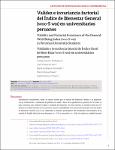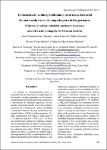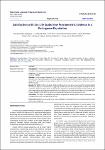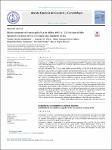Validity and factorial invariance of the general well-being index (Who-5 wbi) in peruvian university students [Validade e invariância fatorial do índice geral de bem-estar (Who-5 wbi) em universitários peruanos] [Validez e invariancia factorial del índice de bienestar general (Who-5 wbi) en universitarios peruanos]

Ver/
Descargar
(application/pdf: 371.7Kb)
(application/pdf: 371.7Kb)
Fecha
2020-05-11Autor(es)
Caycho-Rodríguez, Tomás
Ventura-León, José
Azabache-Alvarado, Karla
Reyes-Bossio, Mario
Cabrera-Orosco, Isabel
Metadatos
Mostrar el registro completo del ítemResumen
ABSTRACT
Introduction: Owing to its importance in the development and evaluation of health policies in favor of the general population, there is currently a greater interest in the study of well-being. Therefore, a valid and reliable measurement of well-being is necessary. In this context, this study evaluated the evidence of validity based on the internal structure, reliability, and factor invariance by sex of the General WellBeing Index (who-5 wbi). Materials and Methods: A total of 499 university students (female = 271; male = 228) from the city of Trujillo, Peru, participated in the study. A confirmatory factor analysis, reliability by internal consistency, and factor invariance by sex were performed using a multigroup analysis. Results: The confirmatory factor analysis indicated that the 5-dimensional model with 5 correlated errors of items 1 and 4 presented a good fit (χ² = 9.667 [gl = 4], p > 0.05; χ²/gl = 2.416; cfi = 0.994; rmsea = 0.053 [ic90% 0.006–0.097]; srmr = 0.018). In addition, acceptable reliability (ω = 0.758) and factor invariance by sex were reported. Conclusion: The who-5 wbi demonstrated empirical evidence in favor of validity based on internal structure, reliability of scores, and factor invariance that allow for a useful and rapid instrument for measuring subjective well-being in university students.
Mostrar más
Cita bibliográfica
Caycho-Rodríguez, T. ...[et al]. (2020). Validity and factorial invariance of the general well-being index (Who-5 wbi) in peruvian university students [Validade e invariância fatorial do índice geral de bem-estar (Who-5 wbi) em universitários peruanos] [Validez e invariancia factorial del índice de bienestar general (Who-5 wbi) en universitarios peruanos]. Revista Ciencias de la Salud, 18(3), 1-15. https://doi.org/10.12804/revistas.urosario.edu.co/revsalud/a.9797
Colecciones
El ítem tiene asociados los siguientes ficheros de licencia:
Excepto si se señala otra cosa, la licencia del ítem se describe como info:eu-repo/semantics/openAccess
Ítems relacionados
Mostrando ítems relacionados por Título, autor o materia.
-
Evidence of validity, reliability and factor invariance of a brief scale of empathy for Peruvian children [Evidencias de validez, fiabilidad e invarianza factorial de una escala breve de empatía para niños peruanos]
Ventura-León, José; Landa-Barzola, Manuel; Valencia, Pablo; Tocto-Muñoz, Shirley; Manzanares-Medina, Eduardo (Centro Interamericano de Investigaciones Psicológicas y Ciencias Afines del Consejo Nacional de Investigaciones Científicas y Técnicas (CIIPCA) y el Centro Interdisciplinario de Investigaciones en Psicología Matemática y Experimental (CIIPME), 2021-01-02)Acceso abiertoLa empatía es conceptualizada como la conciencia de las emociones y cogniciones de los demás y resulta importante en el contexto escolar para el favorecimiento de la convivencia y prevención de conductas agresivas. En ese ... -
Satisfaction with sex life scale: new psychometric evidence in a Portuguese population
Caycho-Rodríguez, Tomás; Vilca, Lindsey W.; Neto, Felix; Peña-Calero, Brian Norman; Schnettler, Berta; Garcia Cadena, Cirilo H.; Barboza-Palomino, Miguel; Neto, Joana; White, Michael (Modestum, 2021-11-04)Acceso abiertoAccepted: 19 Oct. 2021 Introduction: In recent years, greater attention has been paid to research on sexual satisfaction because of its association with general well-being and increased interest in sexual and public ... -
Measurement of coronaphobia in older adults: validation of the Spanish version of the Coronavirus Anxiety Scale [Medición de la coronafobia en adultos mayores: validación de la versión en español de la Coronavirus Anxiety Scale]
Caycho-Rodríguez, Tomás; Vilca, Lindsey W.; Peña-Calero, Brian Norman; Barboza-Palomino, Miguel; White, Michael; Reyes-Bossio, Mario (Elsevier, 2021-11-12)Acceso abiertoBackground and objective The Coronavirus Anxiety Scale (CAS) is an instrument that measures the severity of anxiety due to COVID-19 or coronaphobia. In the context of the COVID-19 pandemic, older adults are the most ...





